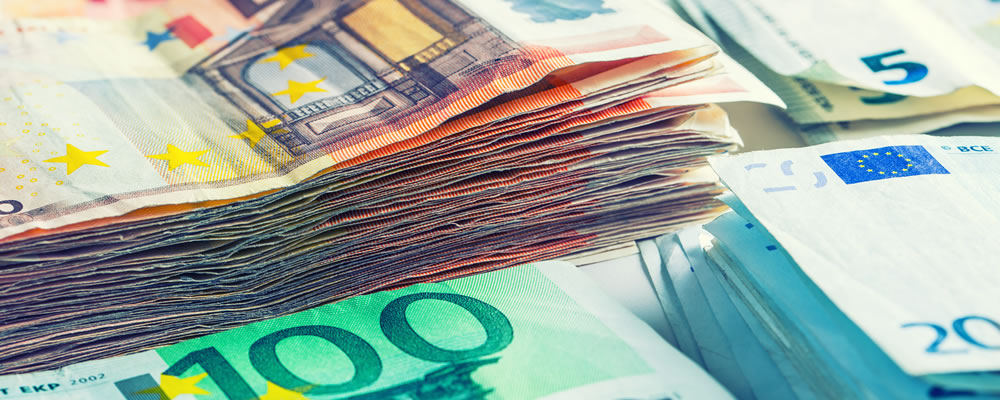As the divisions within the UK government appear to be widening the Euro to Pound exchange rate has trended higher, capitalising on the persistent softness of Sterling.
- Less hawkish Fed outlook helped to boost Euro – Risk of further central bank policy divergence limited by talk of slower monetary tightening
- Pound under pressure from suggestions of increasing Cabinet split over Brexit – Market worries continued over potential loss of single market access
- UK inflation data forecast to shore up EUR GBP exchange rate further – Rising inflation not expected to prompt BoE hawkishness
- ECB meeting in focus – Policy outlook of President Mario Draghi likely to trigger fresh Euro volatility
Steady Eurozone Inflation Data Boosted EUR GBP Exchange Rate
There was no surprise from the finalised Eurozone Consumer Price Index data for September, which confirmed that inflation had ticked moderately higher on the year. This offered further encouragement to the Euro (EUR), although the appeal of the single currency remains somewhat muted ahead of Thursday’s ECB meeting.
As a result, the EUR GBP exchange rate was trending higher in the region of 0.90 towards the close of Monday’s European session.
(Previously updated at 10:20 17/10/16)
It seems likely that the Pound will remain under pressure for the foreseeable future, with the latest UK inflation data expected to offer little support to the ailing currency.
Brexit Speculation Continued to Boost EUR GBP Exchange Rate
Friday’s mixed raft of US data ultimately failed to weigh on the Euro (EUR), leaving markets to continue speculating over the likelihood of the Federal Reserve raising interest rates sooner rather than later. The appeal of the single currency was instead boosted by less hawkish commentary from Fed Chair Janet Yellen, who signalled that the pace of monetary tightening is likely to be slower. As a result, the Euro to Pound (EUR GBP) exchange rate was encouraged to trend higher ahead of the weekend.
Unsurprisingly, Brexit-based worries have continued to weigh on the Pound (GBP) in the meantime, particularly as the week started with reports of growing tensions within the Cabinet. Chancellor of the Exchequer Philip Hammond is rumoured to be at increasing odds with the Brexiteers on the subject of migration and the importance of single market access. This latest bout of anxiety overshadowed a positive Rightmove House Price Index for October, which nevertheless showed the domestic housing market continuing to recover from its referendum jitters.
Pound (GBP) Predicted to Weaken in Response to Rising UK Inflation
Further volatility for Sterling is expected in response to Tuesday’s UK Consumer Price Index report, which could offer another sign of the impact of the Brexit vote on the domestic economy. Forecasts are for a moderate uptick in inflationary pressure from 0.6% to 0.9% on the year in September. This would suggest that the weakness of the Pound has already started to feed through into the wider economy, driving up price pressures.
With the Bank of England (BoE) having already signalled a willingness to let inflation overshoot the 2% target it seems unlikely that an increase here will positively impact the Pound. As monetary policy looks set to remain looser in the long run investors are likely to see little compelling reason to buy back into the weakened currency. Focus is also expected to remain on ongoing political developments, with any additional hard-line comments from government officials expected to put renewed downside pressure on GBP exchange rates.
EUR GBP Exchange Rate Softness Forecast on Less Hawkish ECB Meeting
The Euro’s main influence in the coming week will be speculation surrounding the European Central Bank policy meeting. While there is no expectation for policymakers to enact any changes at this juncture markets are nevertheless keen to get a fresh gauge on their sentiment. Should there be any particular mention of the possibility of the ECB tapering its quantitative easing program the EUR GBP exchange rate could see some strong gains, although particular hawkishness seems unlikely. As researchers at Danske Bank note:
‘President Mario Draghi will, in our view, balance his tone, reflecting the economic resilience to political uncertainty on the one hand but on the other hand, sound dovish, as the ECB is concerned about the subdued underlying price pressure and weakness in the banking sector.’
If investors are ultimately disappointed by a more dovish tone from Draghi then the Euro could return to a weaker trend, with the prospect of continued policy divergence from the Fed offering little cause for confidence. Even if further easing does not seem to be on the table a lack of policy normalisation is unlikely to benefit the Euro.
Current Interbank Exchange Rates
At the time of writing, the Euro to Pound (EUR GBP) exchange rate was trending higher at 0.90, while the Pound to Euro (GBP EUR) pairing was slumped in the region of 1.10.



